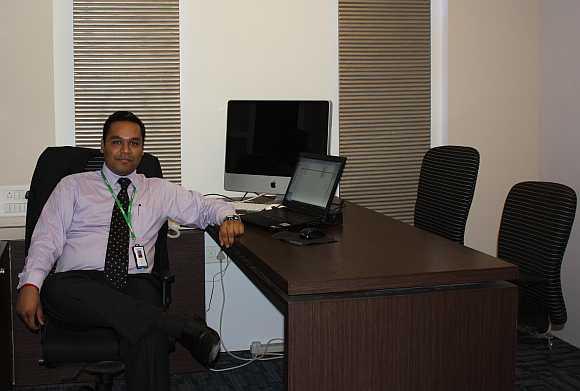 | « Back to article | Print this article |
How he turned his passion into a Rs 13-crore business
It is not a one-man show," says 27-year-old Rohit Gadia who in four years built CapitalVia Global Research into a Rs 13-crore, 550-employee company.
"It is teamwork," he emphasises when asked how he man managed to do it starting with just five employees in June 2008 soon after he completed his one-year executive MBA in Investment Banking and Mergers Acquisitions from S P Jain Center of Management, Dubai-Singapore.
When Rohit began hiring talent for CapitalVia, global stock markets were preparing for a sharp meltdown. Lehman Brothers would file for bankruptcy soon and freeze money markets across the world putting a question mark on Rohit's business model that charged clients fees to offer stock market recommendations. But Rohit was unfazed.
"I knew India would be going through a rough patch too but I knew what I was doing," says he pondering over those dark days that saw massive global layoffs.
Rohit was confident the tide would turn in about 12 months. In anticipation, he began scaling his operations; hiring MBAs and postgraduates from tier II cities, training them, ploughing back every single penny of the profits the company made. By January 2010 the company strength increased to 160. More recently CapitalVia took its overall strength to 550 employees across Indore, Bangalore, Singapore and Delaware, and, is still on a hiring spree.
Rohit speaks with Prasanna D Zore about how he turned his passion into a profitable business and shares his success mantras and his hiring plans. Importantly, like a management guru, he offers unique insights into how to motivate employees, boost their self-esteem and earn their lifetime loyalty.
Stock trading was your hobby as a college student. How did you begin trading in stocks?
I was born and brought up in a very small town Burhanpur in Madhya Pradesh where I studied till Class XII. After that I went to Bangalore for my graduation in commerce from Shri Bhagwan Mahavir Jain College.
I chose Bangalore because I wanted to be independent. I have relatives in places like Mumbai and Delhi but if I had gone there for my studies, there would have been pressure on me to stay with them. I wanted to focus on my studies which would not have been possible had I stayed with my relatives.
In Burhanpur I was like a frog in a well. Bangalore changed all that. I started reading a lot about how stock markets work; how money could be made by trading in shares. I had a lot of time on any given day and I would spend that reading about stocks.
During my second year of graduation I started doing part-time jobs like selling SIM cards and data entry jobs in BPOs. This helped me earn Rs 3,000 a month. It was big money then for a college student. With this money I opened a trading account with Sharekhan because it had a toll free number via which one could buy and sell orders. Being a student I wanted to save every penny I had. Since it was a toll free number I'd call them at least 30 to 40 times in a day.
Apart from that I did my own research by studying fundamental and technical analysis. I wanted to buy a book called The Warren Buffet Way. It cost Rs 1,100 then. I would walk to and from college and save Rs 20 everyday for the book. I bought the book after a couple of months. I was very passionate about trading and reading
I used to interact with people online and write a lot of reviews about buying and selling stocks on my blogs and on various groups on Yahoo! and Google. People started appreciating my trading calls and requested me to give them recommendations. I began by giving trading calls for free to them. Stock trading for me is a hobby turned into passion turned into profession. I didn't intend to charge my followers at that point in time. I was earning enough out of my part-time jobs to take care of my college fees, food and hostel in Bangalore.
'We are hiring and the most important skill we look at is attitude'
You chose to do your MBA from Dubai and Singapore instead of Mumbai. Why?
After my graduation I went to S P Jain to do my MBA from Dubai and Singapore. I wanted to study from Singapore because the way people train and think there is very different from how people in India train and think. If you were to ask a 10 or 15-year-old in India what he wants to become in life, he will probably say a doctor or engineer. If you asked the same question to kids from Singapore or London there answer would be bond trader or equity trader. That made me realise that trading couldn't be a part-time activity. It was when I finished my MBA I realised that I wanted to be an entrepreneur and so I opted out of campus placement.
When I began my MBA the vision that I wanted to start on my own was very clear. By the time I finished my course in 2008 it was very clear that we would be facing rough economic weather going ahead. I knew India would be going through a rough patch but I knew what I was doing.
You finished your graduation from Bangalore but decided to set up CapitalVia in Indore. Why?
It would have been very challenging for me to start CapitalVia in Bangalore. Though I knew the city had superb infrastructure and the talent available there was also very good, the cost of getting both these elements for a successful start-up venture would have been very high. So I knew that to survive a harsh economic situation I would have to begin from a city where costs would not be very high. I chose Indore because I knew I could pare my costs here without compromising on the quality of infrastructure or talent. In Indore I could hire people at half the cost of what I would get in Bangalore.
But more than the cost variable I knew a talented employee in Indore would be more than happy to get paid Rs 100 for doing a job which the same talent in Bangalore would not. It is all about attitude. A world-class office infrastructure in Bangalore would be a given. But if I were to give the same infrastructure to people in Indore they would respect me for that. I knew it would be a great motivation factor for my employees and boost their self-esteem. That would help me retain them longer period after I trained them to serve our clients.
So, cost differential was not the only reason I decided to start CapitalVia in Indore. Today, we hire mostly MBAs and train them rigorously to service our clientele of 2,600 across India and abroad.
Are you still hiring? What kind of skills are you looking at?
We are hiring and the most important skill we look at is attitude. Next comes strong communication. But when I sit for an interview I look at a person's attitude. If the attitude is right we can build on a candidate's communication skills.
Apart from the 550 employees we already have we are planning to hire 225 people more this year to take care of 15 additional branches we plan to start across India. We will be hiring only MBAs and postgraduates for these centres. Almost, 55 per cent of our work force is female and we would like to maintain the ration at our new centres.
'Just one man cannot build a company'
What exactly do you look out for in a person's attitude during an interview?
The candidate should be down to earth and have the passion to learn and accept responsibility and accountability. The candidate must respect the skills brought in by other employees -- irrespective of the person's position in the organisation -- and in turn expect the same from others. One should not feel that an individual is more important to the company than others.
Challenges as an entrepreneur when you began in 2008...
The biggest hurdle was overcoming the prophesies of nay sayers who wanted to pull me and my business idea down from the very beginning.
When we began we only had a five-seater office measuring about 500 to 600 square feet in Indore. I hired four people then who are still with the organisation. So, we were the peons, cleaned floors with water dripping from leaking ACs, did the plumbers' job along with handling clients and offering them technical and fundamental advice on stocks. This is what I mean by attitude.
As a start-up employee you must be willing to do whatever comes your way; doesn't matter even if you are an MBA from a reputed institute.
The other challenge, which we actually loved, was scaling up our employee strength to 550 from five people that we began with.
We knew we wanted to keep our operations low-cost and plough all our profits back into expanding the business. 100 per cent of what we earned was re-invested to scale up operations.
So in four years one man has given employment opportunity to 550 people?
It is not a one-man show. It's teamwork. I hired five people who are now a part of our senior management team. And we together built CapitalVia to its current form.
Just one man cannot build a company. S/he can be a leader, enabler or motivator. A great, cohesive team is the greatest asset of any company. In CapitalVia's case we have had a superb team and I'd not have done anything without their significant contribution.
Tell us about your research team since you are in the business of providing intra day tips in the cash and derivatives segment...
We have a team of 55 researchers, mostly MBAs and postgraduates, who we have trained in technical analysis for nine months and provided them with cutting edge software programmes that give live data to come up with intra day calls. Though these employees come from tier II towns they have been trained rigorously in technical analysis and can match the talent of best analysts anywhere. We train ordinary people to do extraordinary work.
'If you believe in your idea and vision, just go for it'
Your revenue model...
We charge our customers based on their subscription for a month, quarter or a year. We don't share profits or losses made by our clients. We just charge them a fee for our recommendations.
What's your strike rate?
On an average seven out of 10 calls our analysts give hits the bull's eye.
How big is your company in terms of revenues for this financial year?
Last financial year (year ending March 31, 2012) we did revenue of Rs 13 crore. This financial year (ending on March 31, 2013) we will easily notch revenue of Rs 35 crore. We have been consistently growing at 150 per cent every year since inception.
Success mantras...
- The simplest success mantra we all at CapitalVia sincerely follow is work hard. Work hard to the extent that when you go back home and hit the bed you should be fast asleep in a minute. If that isn't happening then you are not working hard.
- Strongly believe in people and entrust them with responsibility. Show faith in their sincere efforts and see your team working wonders for you. There have been instances when I felt people cheated me, but that is okay. If out of ten people who you completely trust even if you get seven who don't breach it, you have won the day.
- As an individual one cannot do much. Come together as a team and see how most difficult of plans get executed.
- Get a strong technology platform with people who understand it so that you and can optimise both for achieving scale.
Start–ups dos and don'ts or lessons you learnt as an entrepreneur
- Instead of going to scores of people seeking advice listen to your own voice. If you believe in your idea and vision, just go for it. The worst that can happen is your idea might fail to take off. But remember it is not a crime to fail.
- If you plan to go ahead with your idea, then don't let people discourage you. Don't stop mid-way. The harder you work, the more you leverage yourself into your vision, lesser is your cost of hiring other people. What I mean is if you do the wok of two people you save the cost of paying one person.



